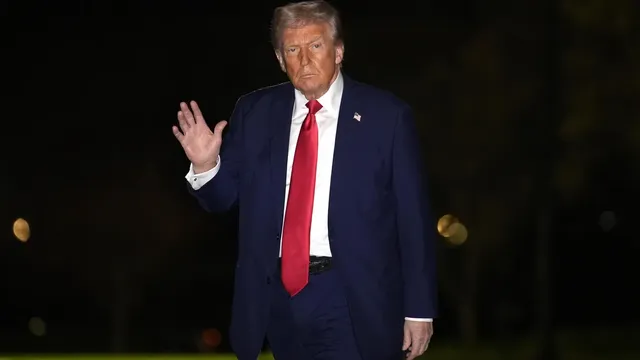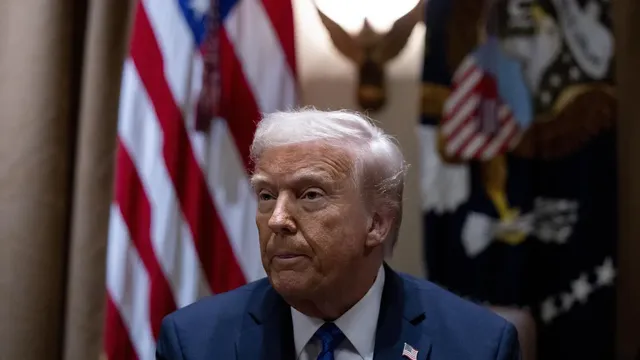There are two analytical principles worth repeating before we look at the many tariffs the Trump administration introduced last week. The first is that we have entered an unstable world order - a condition in which one geopolitical era transitions into the next. All the things that were certain in the past have become uncertain - the storm before the calm that I applied to US policy.
The second is the distinction between geopolitical imperatives and geopolitical engineering. Geopolitical imperatives compel states to act in certain (and predictable) ways. Geopolitical engineering is the way states manage their geopolitical imperatives, a process that requires balancing domestic state politics between those who welcome the new reality and those who oppose it. The outcome is predictable, even if the process in which it emerges is less predictable than the outcome dictated by geopolitical reality.
That being said, the current geopolitical reality is this: the world order that existed in the 20th century has eroded and a new era is being prepared. We are in a period in which the norms of the last century are no longer relevant. This is a rare and troubling time, but throughout human history it has been a normal anomaly.
The order of the last 100 years or so began with the Western European empires, which used their access to the Atlantic to dominate much of the rest of the world, especially the non-European parts of the Eastern Hemisphere. Eastern Europe was largely excluded from imperial power. The United Kingdom got the lion's share of the imperial pie, followed by France, Spain, and the Netherlands. The fact that the continent was so fragmented into independent states made war inevitable.
This European century consisted of three distinct phases. The first was Germany's attempt to restructure its empire and thus Europe, leading to the First World War. The second phase is World War II, which leads to a weak and divided Europe, but to the rise of the Soviet Union and the United States. Their need for access to the Atlantic and control of Atlantic Europe led to the third phase, the Cold War. The United States and the Soviet Union shared Europe. Washington got the western part and Moscow got the eastern part. The ensuing conflict involved a confrontation in Europe along the East-West divide and, crucially, a global war over the remnants of the European empires. Direct wars, proxy battles, covert and overt operations were fought in Africa and Asia, the Middle East and South America, always constrained by the geopolitical reality of mutually assured destruction through nuclear war.
Central to US Cold War strategy was the creation of an economic system that would benefit Washington at Moscow's expense. The economic benefits of allying with the US were greater than the benefits of allying with the USSR. Moscow could offer support to the regimes that ruled a country, but not to the country itself. The US could do both. Washington used its vast wealth to rule Western Europe and the so-called Third World. It developed a strategy to liberalize and facilitate trade throughout the capitalist West, led by the US. This strategy included tariffs that allowed the recovering European economies and the emerging economies of the Third World to gain access to the US market. Thus free trade, as a principle, if not as a reality, became a major weapon in the Cold War, helping to rebuild Western Europe and undermine the Soviet Union. It was not cheap, but the US was able to foot the bill. US wealth allowed its economy to function effectively despite unbalanced tariffs and foreign aid. It was also politically successful; domestic prices in the US remained low due to the low cost of imported goods produced with cheap labour. This was profitable for both the US and its client states.
In some ways, the Cold War outlasted the fall of communism. Russia remained a military power and the US continued its strategy of military and economic warfare. But the war in Ukraine was the real nail in the coffin of the Cold War. The limitations of Russian military and economic power forced Washington to reconsider its imperative to confront Russia, defending Europe, and indeed the very value of the economic dimension of the Cold War. The transfer of industrial production to the areas of the disintegrated European alliance created in the United States a system of dependence on foreign production.
In plain language, this means that halting or cutting off exports from these countries, especially China, could undermine the US economy. Countries on which the US depended were subject to domestic forces such as strikes, uprisings, coups, etc. The financial costs and benefits to the US in these relationships have changed, and the risks of dependence are becoming greater as offshoring increases. For example, China may decide to forgo the economic benefits of exporting to the U.S. in favor of the political or military benefits of weakening U.S. manufacturing. Strikes or unrest in Europe could do the same, even without the intent to harm the United States.
Free trade - or trade in which tariffs strengthen other countries' finances and weaken the buyer's economy - can become so extreme that the risks outweigh the benefits. The financial dimension can be positive or negative for a country, but the availability of manufactured goods depends not only on the benefits to exporting countries, but also on the geopolitical ambitions (and stability) of those countries. China is a historically unstable country. Other countries are more or less unstable. The danger of a country being unable to continue to supply essential products to the US because of ambition, war or instability is magnified to the extent that it relies on imports to drive its own economy.
Availability and low prices are not guaranteed in international trade. The US has created a system that is useful in theory but vulnerable in practice to domestic events in exporting countries. However, accompanied by accelerating financial imbalances, the system has become obsolete. It is not surprising, therefore, that as the Russian threat fades, the US is changing its strategies, including on trade.
We are moving from a process of imperatives driven by geopolitical realities to designing a new reality. Financial issues are part of the economic process, just as military issues are part of the geographical process, and both are part of geopolitics. The recent rise in tariffs is part of the re-engineering of the financial system. While the broad geopolitical analysis has an unsettling elegance, the engineering has a more detailed reality. Consider a river and the design of a bridge over it. The course of the river is predictable. Engineering is more complex and error-prone. When considering President Donald Trump's recent actions, the river must be crossed, but building a bridge is complicated and uncertain - and prone to error. A blueprint for redefining the system must therefore be developed, although the outcome of Trump's initial actions is uncertain, even if their intent seems clear.
His intention is to shock the system and, I assume, open the door to more precise design, though it must be demonstrated in history and then either codified as the previous system was or quickly dismissed as an economic failure. There are many economic interests in sectors of the U.S. economy where the immediate benefits outweigh the long-term risks, and in sectors where financial reality has already had a major impact. Trump is clearly trying to get as much work done in his first 100 days - before the honeymoon is over. With about 20 days to go, and with Democrats recovering from the shock of defeat and Republicans unsure but still loyal, Trump may conclude that long-term planning and coalition building are impossible. But as other presidents before him have done, he is acting quickly and dramatically, hoping to revise later if necessary. This is an engineering issue - to act with unexpected speed in a seemingly inconsistent way, to restructure when forced to back down by strong opposition nationally and internationally, but having established the strategic principle for the negotiations that will construct the outcome.
It is imperative to move beyond the trading system that Russia's weakness has rendered obsolete. This behaviour is not unprecedented and was not invented out of thin air. But engineering is where uncertainty lives. The unstable world is trying to find new footing. | BGNES
-----
George Friedman, Geopolitical Futures

 Breaking news
Breaking news
 Europe
Europe
 Bulgaria
Bulgaria







